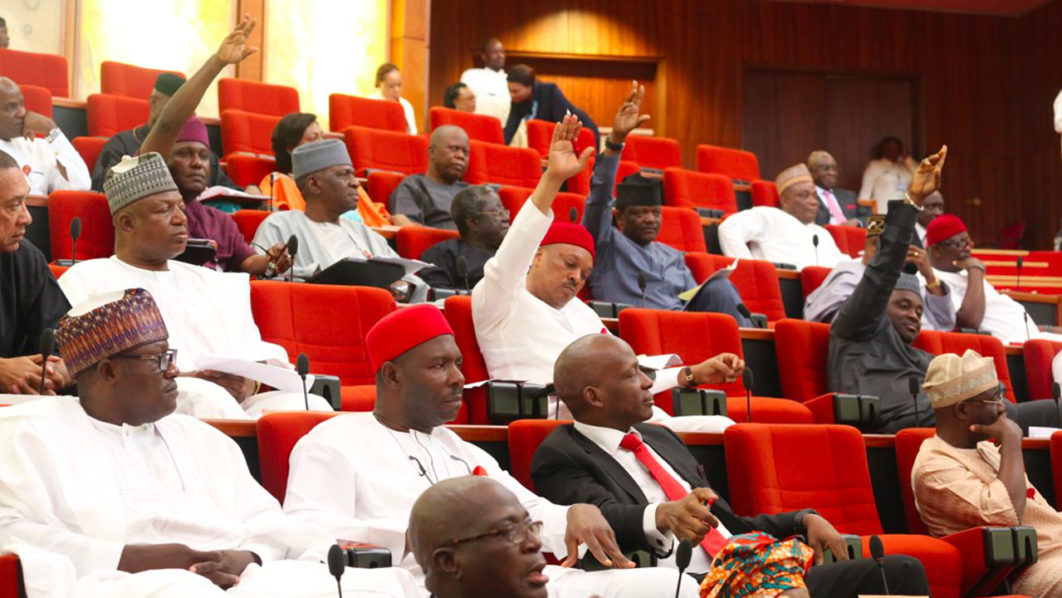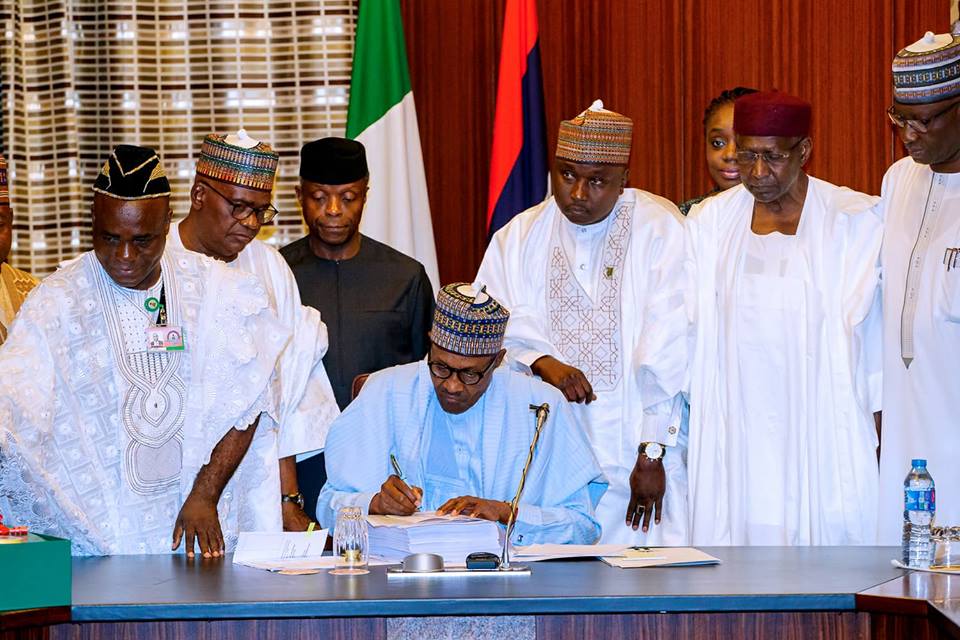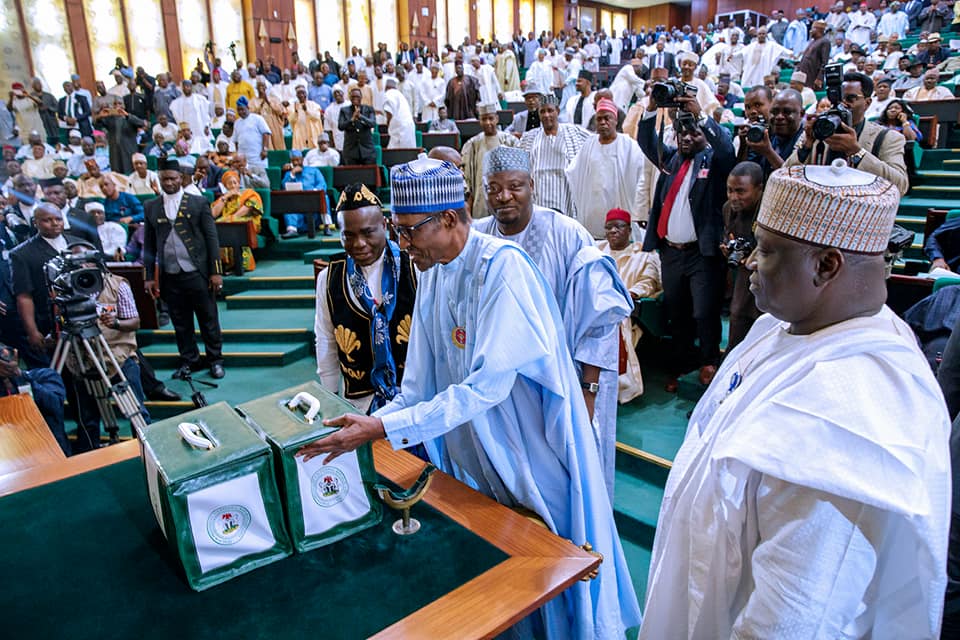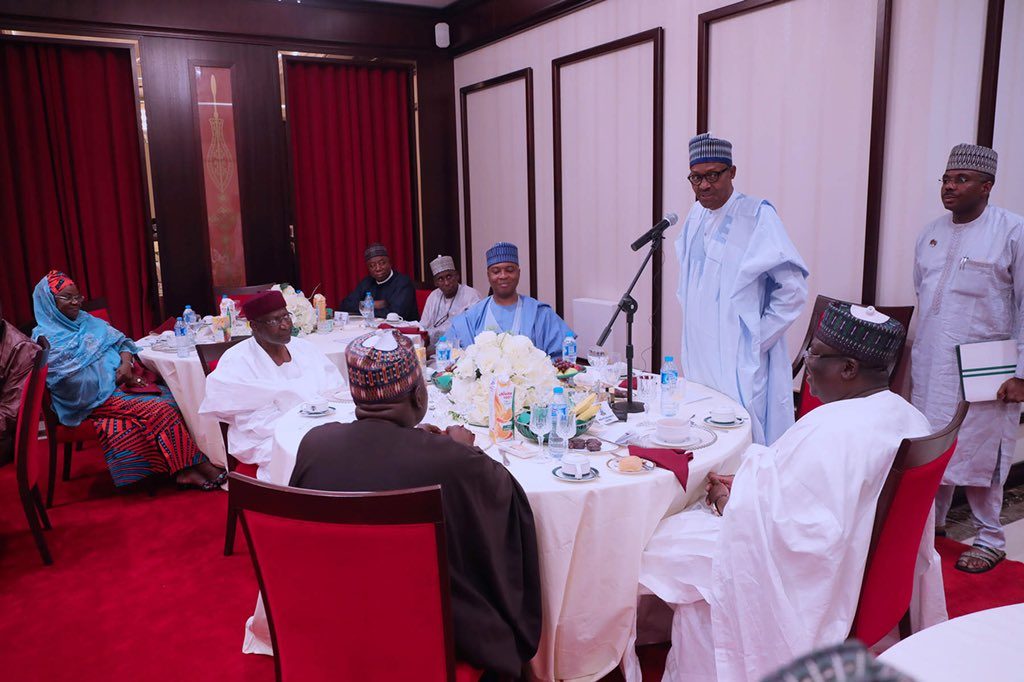Economy
Lagos Signs 2018 Budget Into Law, Targets N897b Revenue
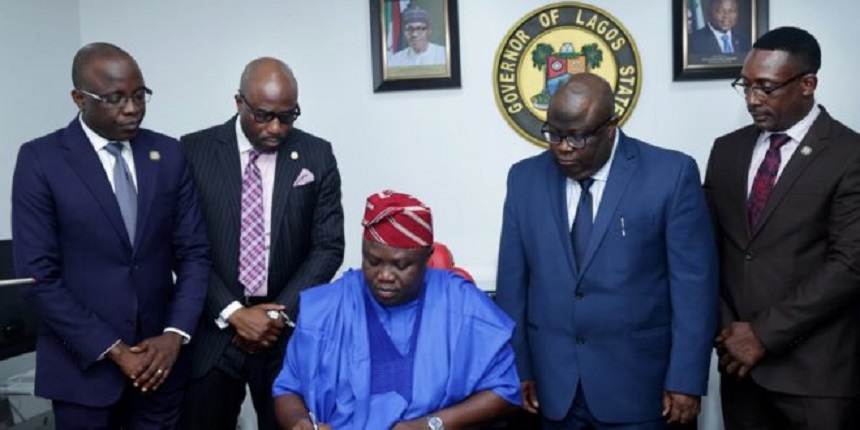
By Modupe Gbadeyanka
On Monday, Governor Akinwunmi Ambode of Lagos State signed the 2018 Appropriation Bill of the State into law with a total budget size of N1.046 trillion.
A breakdown of the budget showed that it comprises N347.038 billion to be funded from the Consolidated Revenue Fund, and N699.082 billion from the Development Fund for both capital and recurrent expenditure for the year ending December 31, 2018.
Also yesterday, the Governor signed two critical bills into law; the Consolidated Transport Sector Bill and the Lagos State Teaching Service Commission Bill.
The Transport Sector Law 2018 provides for the development and management of a sustainable transport system in the State, as well as development, management and maintenance of transport infrastructure and facilities within the State.
The law also regulates the provision of an efficient transport delivery system and ensures availability of a safe and affordable transportation system. It is hoped that with this law, an efficient integrated transport management system will evolve in the State.
On the other hand, the Teaching Service Commission Law 2018 provides for the control and management of teaching service matters in the State, and for connected purposes.
The law regulates and co-ordinates the management of teaching service matters and provides uniform guidelines for the effective management of Post-Primary Schools in the State.
Governor Ambode, while presenting the 2018 Appropriation Bill to the State House of Assembly, had pledged that his administration would make every effort to complete all ongoing projects as well as initiate new ones to consolidate on the development recorded in the last two and half years.
He said the budget, christened as “Budget of Progress and Development”, would be used to consolidate on the achievements recorded in infrastructure, education, transportation/traffic management, security and health sectors, among others.
Outlining the key components of the budget, Commissioner for Economic Planning and Budget, Mr Olusegun Banjo, said capital expenditure would gulp N699.082 billion, while N347.039 billion would be dedicated to recurrent expenditure, representing a Capital/Recurrent ratio of 67 percent to 33 percent and a 28.67 percent increase over 2017 budget.
He also listed key projects captured in the 2018 Budget to include the Agege Pen Cinema flyover; alternative routes through Oke-Ira in Eti-Osa to Epe-Lekki Expressway; the 8km Regional Road to serve as alternative route to connect Victoria Garden City (VGC) with Freedom Road in Lekki Phase I; completion of the on-going reconstruction of Oshodi International Airport Road into a 10-lane road and the BRT Lane from Oshodi to Abule-Egba.
According to sectoral breakdown of the budget, General Public Services is earmarked to gulp N171.623 billion, representing 16.41 percent; Public Order and Safety, N46.612 billion, representing 4.46 percent; Economic Affairs, N473.866 billion, representing 45.30 percent; Environmental Protection, N54.582 billion, representing 5.22 percent, while Housing and Community Amenities got N59.904 billion, representing 5.73 percent.
Health sector got N92.676 billion, representing 8.86 percent; Recreation, Culture and Religion got N12.511 billion, representing 1.20 percent; Education got N126.302 billion representing 12.07 percent, while Social Protection got N8.042 billion representing 0.77 percent.
Under the budget, there are provisions for completion of the five new Art Theatres; establishment of an Heritage Centre at the former Federal Presidential State House recently handed over to the State Government; a world class museum between the former Presidential Lodge and the State House, Marina; construction of four new stadia in Igbogbo, Epe, Badagry and Ajeromi Ifelodun (Ajegunle) and completion of the on-going Epe and Badagry Marina projects.
On Housing, there are provisions for completion of on-going projects especially those at Gbagada, Igbogbo, Iponri, Igando, Omole Phase I, Sangotedo and Ajara-Badagry under the Rent-to-Own policy, among others.
Also speaking, Commissioner for Finance, Mr Akinyemi Ashade put the projection for revenue (IGR) at N897 billion, while the remaining part of the budget would be funded by deficit financing.
“Today is a good day in our State, the Governor just signed the 2018 Appropriation Law. For the first time the Law has about N1.046 trillion as total amount that we would spend in 2018.
“The Budget is tagged “Budget of Progress and Development” and in terms of capital and recurrent expenditure, we have 63 percent Capital and 37 percent Recurrent and that shows that we are really big on infrastructural renewal.
“In terms of revenue, we are expecting a total of N897 billion both from the State and Federal receipts, so the rest would be funded through budget deficit financing.
“We are focusing this year on completing all projects that we have started knowing fully well that people would say that this is an election year, but the Governor is focused on delivering the dividends of democracy; we are not slowing down, we want to really ensure that we touch every aspect of Lagos that needs to be touched in terms of infrastructural renewal, welfare and other things that the Governor promised,” Mr Ashade said.
Economy
Uzoka-Anite Warns Against Inflation Risks from Oil, Gas Earnings Surge

By Adedapo Adesanya
The Minister of State for Finance and chairman of the Federation Account Allocation Committee (FAAC), Mrs Doris Uzoka-Anite, has cautioned that a projected surge in oil and gas revenues following President Bola Tinubu’s latest executive order could trigger inflationary pressures and exchange rate volatility if not carefully managed.
She said that the recent executive order mandating the direct remittance of certain oil sector revenues to the federation account would provide regulatory clarity and significantly strengthen revenues accruing to the federation account, but warned that sudden liquidity injections into the economy may complicate monetary policy coordination with the Central Bank of Nigeria and erode the real value of allocations to federal, state and local governments.
While addressing members of FAAC in Abuja, Mrs Uzoka-Anite commended President Tinubu on the order, describing the development as a structural fiscal correction aimed at restoring constitutional discipline to petroleum revenue management and enhancing distributable income across the three tiers of government.
She said that the revenue outlook was improving due to ongoing structural reforms introduced by the Federal Government.
According to her, the newly implemented tax reform measures are broadening the tax base, improving compliance and enhancing administrative efficiency.
“Also, the executive order signed by Mr President on February 13 is reinforcing revenue discipline in the oil and gas sector and reducing leakages,” she said.
The minister said that the order suspends the 30 per cent allocation to the Frontier Exploration Fund (FEF) and suspends the 30 per cent management fee on oil and gas profit payable to NNPC Limited.
She said that the order also directed that gas flare penalties be paid into the federation account, and mandated full remittance of petroleum revenues without unconstitutional deductions.
Mrs Uzoka-Anite said that the reform marks a shift from a retention-based oil revenue model to a gross remittance, federation-first model.
“The implications for FAAC are very significant; more oil and gas profit will now flow directly into the federation account.
“Gas flare penalties will become distributable revenue, and previously retained management fees will no longer reduce remittable inflows,” she said.
She said that the reforms were expected to result in higher monthly gross inflows into the federation account, and increased allocations to federal, state and local governments.
The minister said that a retrospective audit of the FFF, the Midstream and Downstream Gas Infrastructure, was due, and NNPC management fee deductions could lead to recoveries that may provide a one-off fiscal boost.
She welcomed the improved revenue outlook and cautioned against the risks associated with sudden liquidity injections.
“Experience shows that when revenues rise sharply and are distributed fully and immediately, large liquidity injections can increase inflationary pressures, complicate monetary management and reduce the real purchasing power of allocations,” she said.
She said that excess aggregate demand, exchange rate pressure, asset price distortions and inflationary risks could arise if increased inflows were not carefully managed.
Mrs Uzoka-Anite said that to mitigate such risks, she proposed phased disbursement of one-off recoveries.
She suggested that retrospective recoveries be staggered rather than injected into the economy in bulk, with a portion temporarily warehoused in a stabilisation buffer.
She also recommended strengthening the excess crude and stabilisation buffer mechanism to channel part of incremental inflows into a fiscal stabilisation window.
“This could offset revenue shortfalls in weaker months and reduce procyclicality in spending.
According to her, enhanced coordination with the CBN would be pursued to align fiscal injections with liquidity management tools and support open market operations where necessary.
Mrs Uzoka-Anite urged states and federal Ministries, Departments and Agencies (MDAs) to prioritise capital expenditure over recurrent expenditure.
She called for investment in infrastructure, agriculture, energy and other productive sectors, and avoid unsustainable wage or consumption spikes.
“Productive spending expands supply capacity and mitigates inflation,” she said.
She also announced plans to introduce monthly revenue transparency dashboards, production-to-remittance reconciliation reporting, and clear reporting of incremental inflows arising from tax reforms and the executive order.
The junior finance minister said that the reforms presented an opportunity to deepen fiscal federalism, enhance distributable revenue, restore constitutional clarity and strengthen trust among tiers of government.
She also advised that increased revenue must not translate into fiscal complacency.
“We must resist the temptation to treat incremental inflows as permanent windfalls. We should reduce debt burdens, clear arrears responsibly, build buffers and invest in growth-enhancing sectors,” she said.
Economy
Dangote Refinery Shares to be Available to Public in Five Months

By Adedapo Adesanya
The chairman of Dangote Group, Mr Aliko Dangote, has said that within the next five months, Nigerians should be able to purchase shares of Dangote Petroleum and Refinery.
Mr Dangote made this revelation on Sunday during a tour of the facility by the chief executive of the Nigerian National Petroleum Company (NNPC) Limited, Mr Bayo Ojulari, alongside members of the company’s executive management.
The $20 billion refinery is the largest single-train refinery in the world with 650,000 barrels per day refining capacity. There are efforts to boost the capacity to 1.4 million barrels per day soon.
Speaking with journalists, Mr Dangote said, “And the other issue is that they (NNPC) are holding 7.25 per cent of the shares that we have here, which is more than the shares Elon Musk has in Tesla. And they are holding that on behalf of Nigerians,” he said.
“So individually, Nigerians too will have an opportunity in the next, maybe a maximum of four to five months. There will actually be an opportunity to buy the shares.”
He added that shareholders will have the option to receive their dividends in either naira or dollars, as the refinery also earns in dollars.
Commenting on Mr Ojulari’s visit, the billionaire businessman said the NNPC, represented by Mr Ojulari and its management team, was not just a guest but a shareholder.
“Today is really our best day ever” at the facility. I know NNPC invested in us when we were not really sure whether the refinery would be successful.
“So that’s the kind of level of confidence. But right now, the relationship with the new set of people that we have at NNPC, I think the sky is the limit, and we will cooperate and also make sure that we work together to make sure that we make Nigerians proud.”
Speaking on prospects of partnership with NNPC in the upstream sector, he said, “We have block 71, 72, but we’re going to look much deeper”.
“Most likely, depending on our own discussions with them, we will partner with them, maybe in some of the upstream. They, too, will partner with us here because here is not just a refinery, it’s an industrial hub.
“And that’s why we’re doing linear alkaline benzene, which is a raw material for detergents, ” he added.
Economy
NGX Investigates Zichis Stocks After 859% Rise in One Month

By Aduragbemi Omiyale
The Nigerian Exchange (NGX) Limited has launched an investigation into trading activities on the shares of Zichis Agro-Allied Industries Plc.
A notice from Customs Street on Monday disclosed that this has led to the suspension of the company for now.
This development comes about a month after Zichis was listed on the domestic bourse and placed in the growth board of the NGX.
In the circular, it was disclosed that the suspension may be lifted after the conclusion of the findings, but for now, investors will not be able to trade the organisation’s securities on the NGX platform.
“The suspension of trading in Zichis shares shall be lifted upon the conclusion of an investigation into the trading activities on the company’s shares,” a part of the disclosure stated.
The bourse explained that it wielded the big stick on Zichis in compliance with Rule 7.0, Rules on Suspension of Trading in Listed Securities, Rulebook of The Exchange (Issuers’ Rules).
This part of the law states that, “Notwithstanding any of the foregoing provisions, the exchange may, in accordance with any of its rules, place the trading of any security on suspension.
“It may also do so if it is of the view that such suspension will be in the interest of the investing public and in accordance with the SEC Rules.”
In announcing the action on the firm, the NGX declared that, “The shares of Zichis Agro-Allied Industries Plc have been suspended from trading on the facilities of Nigerian Exchange Limited (NGX), effective today, Monday, February 23, 2026.”
Business Post reports that last week, shares of Zichis appreciated by 60.74 per cent to N17.36. It joined the stock exchange at N1.81, indicating it has gained N15.55 or 859.12 per cent in one month.
-

 Feature/OPED6 years ago
Feature/OPED6 years agoDavos was Different this year
-
Travel/Tourism10 years ago
Lagos Seals Western Lodge Hotel In Ikorodu
-

 Showbiz3 years ago
Showbiz3 years agoEstranged Lover Releases Videos of Empress Njamah Bathing
-

 Banking8 years ago
Banking8 years agoSort Codes of GTBank Branches in Nigeria
-

 Economy3 years ago
Economy3 years agoSubsidy Removal: CNG at N130 Per Litre Cheaper Than Petrol—IPMAN
-

 Banking3 years ago
Banking3 years agoSort Codes of UBA Branches in Nigeria
-

 Banking3 years ago
Banking3 years agoFirst Bank Announces Planned Downtime
-

 Sports3 years ago
Sports3 years agoHighest Paid Nigerian Footballer – How Much Do Nigerian Footballers Earn


